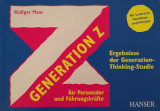Generation Z for HR managers and executives by Rüdiger Maas. Brief insights into the book. This article is recommended for anyone who would like to deepen their knowledge from my presentation or would like to review or rework some things. It is of course also suitable for newcomers who are not familiar with the lecture and are interested in Generation Z.
Rüdiger Maas' book on Generation Z is characterized in particular by the fact that the author always gets to the point quickly. The book is therefore ideal for anyone who has little time, i.e. as the title suggests, especially HR managers and executives ;-). I read the entire book in just under 2 hours, including the foreword and bibliography.
But that brings me to my first point of criticism: yes, you get a lot of knowledge about Generation Z in a crisp way. But this means that some things are presented in a very abbreviated way. In my opinion, it is important to take a stand on the question of whether there really is "one" Generation Z or whether there are in fact a whole range of different subgroups. And whether there are not many similarities despite these groups. In addition, some technical terms are simply taken for granted (e.g. work-life balance, work-life blending, work-life separation) and hardly explained. The same applies to the one or other table that is illustrated without much explanation. This leaves me too much room for my own (and possibly incorrect) interpretations.
The first quote from Socrates makes the book very appealing to me. It's the same one I start my lectures with. And so we have the same basic tenor: values are changing, but that's not a bad thing per se. And the more we know about change, its causes and motives, the better we can deal with it. Only then can we understand and either rethink our own values or specifically encourage the younger generation to adopt some of the meaningful values of their "elders". An excellent quote from the book also fits in with this:
"Thinking and empathizing with the respective generations is the basis of successful HR work and leadership."
The subtitle of the book "Results of the Generation Thinking Study" was another incentive to buy the book. Because, as you can probably tell from my page here, I'm a fan of science. And the author and his team have conducted their own study, on which his book is based. Unfortunately, however, the scientific part is extremely thin. Hardly anything is revealed about the methodology, not a word is mentioned about the quality criteria and their control, and the bibliography really doesn't deserve its name. Perhaps the author wanted to save stressed readers time, but then the interested reader should at least have the opportunity to delve deeper into the study in an appendix or via a link in order to be able to evaluate its quality.
The proportion of new findings produced by the study is also relatively low. Almost all of the content can also be found in other literature. However, this is not a bad thing, as it means that these points are "triangulated", i.e. underpinned by several sources or studies.
Overall rating

Overall rating: 3 out of 5 stars. The book's strength is, unfortunately, also its weakness in parts.
The book actually deserves 5 stars. It has a great layout, is very easy and quick to read and covers a lot of important topics about Generation Z. And the author manages to do three things that many academics don't manage: He gets to the heart of the matter, has a very pleasant writing style and also comes up with realistic recommendations and solutions.
However, one point is deducted for the often very abbreviated descriptions and another point for the lack of scientific evidence.
Here you can find more about Generation Z on my website.


